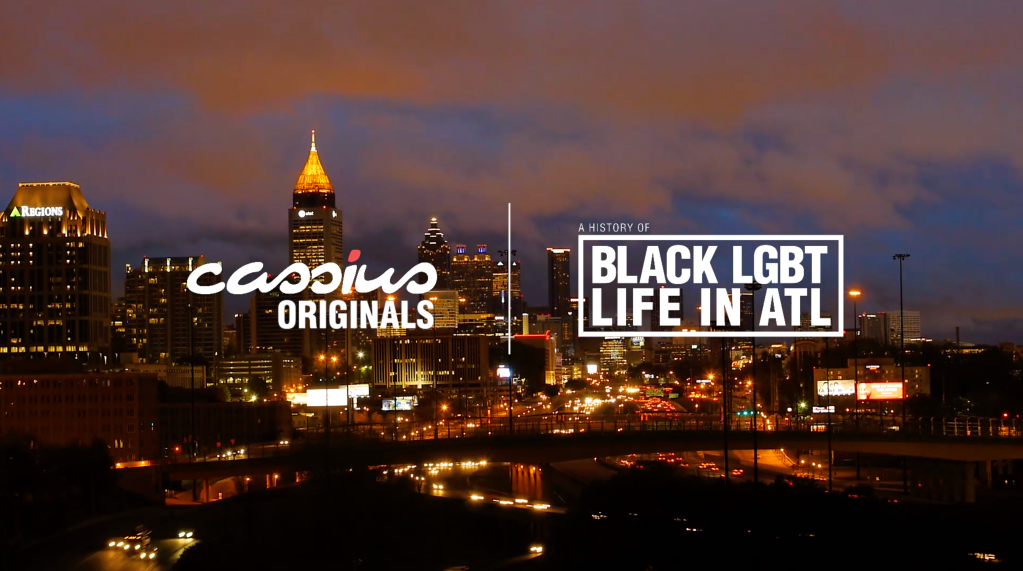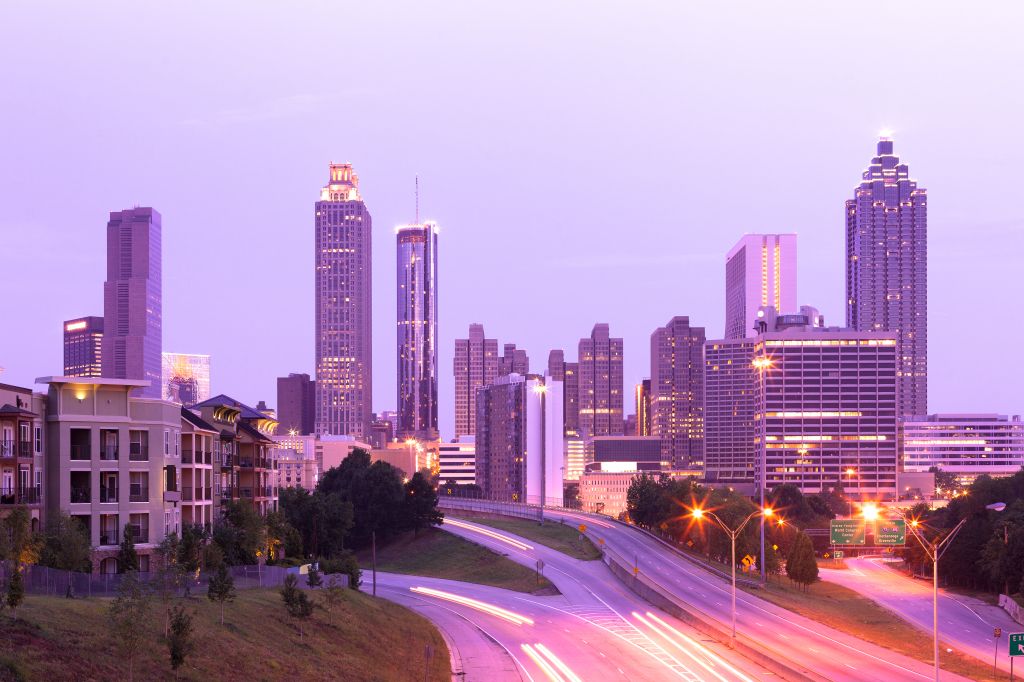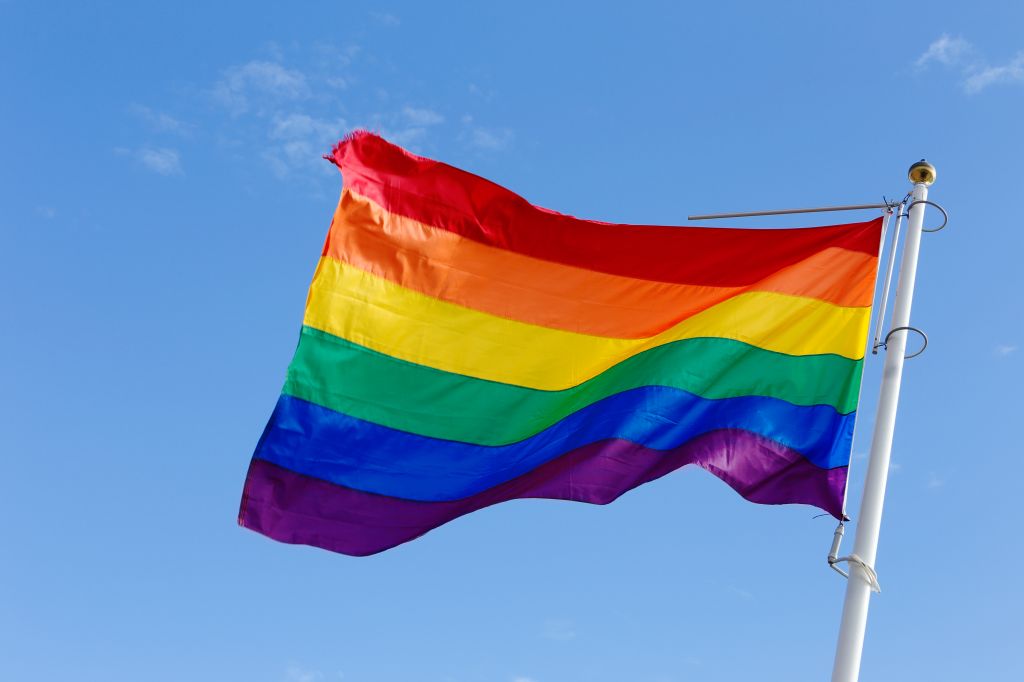Got Something to Say, CASSIUS’ four-part video series examining Black LGBTQ+ life in Atlanta, kicks off with “Episode 1: Surviving Through Struggle.” Check it out above and read below for a brief history of how the city became the home of a lasting legacy.

Source: Courtesy of Cassius / Courtesy of CASSIUS
The Chattahoochee River travels down from the North Georgia mountains, carrying within its currents memory, history and sorrow. This is the river you cross in Atlanta when venturing into the affluent northern suburbs.
There have been Black queer bodies found in that river, washed up along its shores. I think of Jimmy Ray Payne and Nathaniel “Silky” Cater, whose bodies were discovered there, tying Wayne Williams to the Atlanta Child Murders back in ’81. The Chattahoochee also separates Atlanta from Cobb County. The county, after passing a 1993 resolution condemning the “homosexual lifestyle,” was shut out of the historic 1996 Atlanta Summer Olympic Games, due in no small part, to the brave and brilliant activism of Atlanta native and black LGBTQ community icon, Pat Hussain. These two events, separated by a decade, help describe how Atlanta is both a site of unspeakable trauma and a site of stunning triumphs. This is the history from which we descend and in part how the city became known as not only the Black mecca but the Black gay mecca.
Our memories are not ghosts, yet they haunt us. There is much we don’t know about our past, and may never know. Too many of our ancestors left without being able to pass on their stories or had their legacies erased. Obituaries wiped clean of any hint of queerness, misremember our dead. They will never be called forth in Donald Glover’s Atlanta, or the Atlanta of OutKast, NeNe Leakes, Mona Scott-Young, or 2 Chainz.

Source: Jose Luis Stephens / EyeEm / Getty
To understand how Atlanta became the Black gay mecca, the most Wakandian of the Black gay metropolises, we have to begin with the Marquette. Henri McTerry who passed away this past spring, and one of our great elder statesmen, was first introduced to the Marquette back in 1972. In an interview with writer and activist Craig Washington, in his essay “Fall Down On Me,” McTerry described the Marquette of the 1970s as “a bar with the cheapest liquor and Donna Summer rocked that house.” Dee Dee Chamblee, the founder and executive director of LaGender, also visited the Marquette in the ’70s era. She described it as “world known, world-wide known,” in an oral history. Years later she would even meet her husband there.
In the 1970s James Baldwin knew about Atlanta. He captured the city in his magnum opus Just Above My Head where he wrote one of the best love scenes ever between two Black men. A year after the novel was published, the Gay Atlanta Minority Association (GAMA) was founded and sponsored a forum during Gay Pride Week called “Black Lesbian/Gay/Transperson Survival in the ‘80s.” Perhaps they had a premonition of what would follow.
To talk about Black LGBTQ movement history is to also talk about catastrophe, and how our collective response to catastrophe as Black LGBTQ people, shaped our collective identity and destiny. In 1981, what would later become known as HIV, first came to public awareness through a report by the Atlanta based Centers for Disease Control and Prevention (CDC). As Dee Dee Chamblee poignantly shares in a profile about her work: “we couldn’t even keep up with how many people were dead,” and “it was like at least two or three every other day of your friends, of people you know. And we had no grief counseling or anything like that. So the community just kind of like blotted it dry.” A year after Duncan Teague (now Rev. Duncan Teague) arrived in Atlanta, he was already taking action, having organized a meeting in his living room to strategize a community response. And yet in what amounted to a crisis, as Black queer bodies suffered from the pervasive state violence of the early years of the HIV epidemic that structured our social worlds, we witnessed a proliferation of organizations in the following decade. This served not only as a testament to our survival but the evidence of our determination to create beauty and joy in the midst of disaster.
Throughout the 1990s, Black LGBTQ organizations were founded, shaping the political landscape of the city: ZAMI now ZAMI NOBLA (1990) came about after seceding from another iconic Atlanta organization, the African-American Lesbian and Gay Alliance or AALGA, the organization that would eventually become Afrekete was founded on the campus of Spelman College (1991), Second Sunday (1992), Southerners on New Ground or SONG (1993), Adodi Muse (1995), Keiron Williams would attempt to found a Black gay/bi men’s organization on the campus of Morehouse College called Morehouse Adodi in 1995, but the charter was denied by the Student Senate, In the Life Atlanta or ITLA (1996), Aniz, Inc (1996), and Unity Fellowship Church of Atlanta (1997).

Source: Roland Magnusson / EyeEm / Getty
In the fall of 2000, I transferred to Georgia State University from Morehouse College. The first course I walked into that semester was African-American Lesbian and Gay Activism taught by Dr. Layli Phillips (now Layli Maparyan), who was on the Women’s Studies faculty at the time. We read works by Barbara Smith, Audre Lorde, Pat Parker, Essex Hemphill, and Joseph Beam, to name a few. The course changed my life and was in sense indicative of the Black queer aughts, where our community witnessed courageous grassroots activism coupled with emerging institutional access. In this decade we continued to see the proliferation of some of our most incredible institutions: the founding of LaGender in 2001 by Dee Dee Chamblee, who created the organization because as she says in an interview, “When I found out that trans people weren’t being allowed in the 15 homeless shelters, that’s what really got me going. So, the next thing I know I’m building an organization.” In 2007 Cheryl Courtney-Evans, who was a mentor and guiding light for so many of us, co-founded and became the executive director of Transgender Individuals Living Their Truth (TILTT). I first met Cheryl at Queer Progressive Agenda (QPA), and always appreciated her willingness to speak truth to power. She is now an ancestral energy still looking out for us on the other side. I imagine her as an angel with long flowing wings whispering sweet words of revolution in our ears when we need it most.
In 2002 in response to the beating of a Morehouse College student named Greg Love, a thunderous community response erupted that completely shifted the campus climate of the Atlanta University Center. As if a spirit was unleashed that spread ferociously throughout the city, we witnessed Black LGBTQ campus organizing from Georgia State University to Agnes Scott, which can only be thought of as the Atlanta Black LGBTQ student movement of the early aughts.
Our Black LGBTQ archive need not be a graveyard for our dead, but a blueprint for our future.
It’s difficult to imagine the present moment from a historical perspective— we may never know what will be made of our era. But one thing is for sure, we are still very much experiencing powerful voices resisting, organizing, fighting and loving. In this past decade, we have witnessed the elections of several Black LGBTQ people locally: Joan Garner (who passed away in 2017), Simone Bell, the first Black lesbian in the United States elected to a state legislature, Park Cannon her successor, Rashad Taylor, and Keisha Sean Waites. In 2017, Georgia Representative Renitta Shannon made history by coming out as bisexual. In 2016 Tracee McDaniel, who is one of Atlanta’s most respected leaders and a powerful force in our community, made history by being the first trans person appointed to the citizen’s board by former Atlanta Mayor Kasim Reed. Holiday Simmons was named an Atlanta Pride Grand Marshall and also joined the iconic Performance Poetry group Adodi Muse. The class I once took at Georgia State University has most recently been taught by my friend, comrade, and fellow Atlanta native, Dr. Ashley Coleman Taylor, who updated it to “Black Queer and Trans Activism.”
There remains an inspiring and powerful Black LGBTQ liberation spirit you can find in the work of such organizations as Southerners on New Ground (SONG), Solutions Not Punishments Collaboratives (SNaP Co), SPARK Reproductive Justice NOW, the annual Rustin Lorde Breakfast, and Southern Fried Queer Pride. We have a rich past that we can draw from to build off and advance. There are many debates as to whether or not Atlanta is still the Black gay mecca or even the Black mecca. But the reality is like our ancestors and elders before us, these things are determined by our vision and will. Our Black LGBTQ archive need not be a graveyard for our dead, but a blueprint for our future.
Our four-part series on Black LGBT life in Atlanta, highlights the thriving of a bustling and innovative community, that can call the metropolis home. Watch part one above.
Charles Stephens is an Atlanta based writer and activist. Follow him on Twitter, @charlesdotsteph.
















